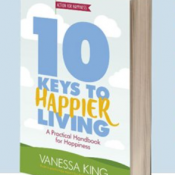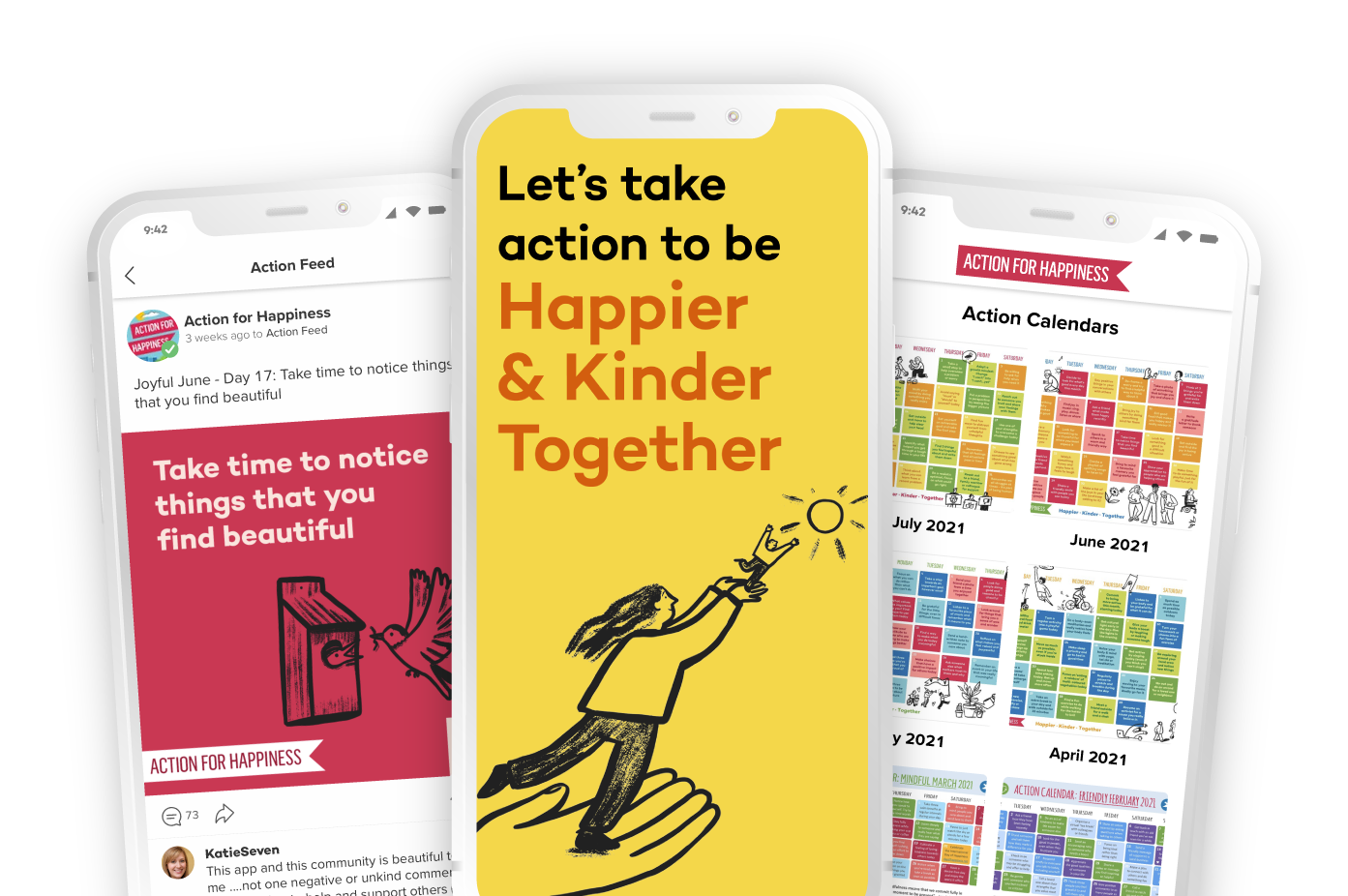Meaning
Be part of something bigger
Meaning matters for a fulfilling and happy life.
We all matter and can make a difference to something bigger, beyond ourselves.
When we ask people what happiness means to them, their initial thoughts usually describe pleasures – things that in the moment bring joy or other fleeting, positive feeling emotions. However, soon their thoughts turn to a different type of happiness. Friends, family, pets, work, volunteering, learning, hobbies, creative pursuits like making music or art, nature, faith – examples of things that give life meaning. Working on and towards these things doesn’t always feel pleasurable at the time but enables longer-term satisfaction and fulfilment.
The ancient Greek philosopher, Aristotle, described a form of happiness that he argued was more important than pleasure alone - ‘activities of the soul that are in accord with virtue’, in other words, help us strive towards the best within us. He called this Eudaimonia [1]. Meaning in life is integral to this and alongside pleasure, is incorporated into modern-day psychological theories and models of happiness, wellbeing and flourishing [2].
Psychologists certainly agree that meaning matters for happiness and there are actions that can help us find or create it. In fact, all the other Keys to Happier Living can contribute to finding and creating meaning in your life.
We are all part of something bigger
Meaning in life can feel like a mysterious or esoteric topic, one that philosophers through the ages, and later psychologists, have tried hard to pin down. At its core, it’s a sense of being connected to, part of, and/or contributing to something bigger, beyond ourselves [3]. This might sound huge but it isn’t, we are all connected to the world around us in a myriad of ways which means there are many ways we can make a difference.
Reflection: Think of all the ways you are connected to and make a difference in the world around you. For example, the farmers that grow the food you eat; the people you pass by or say hello to in your local area; the people you help at work or in your community; the people you care about and who care about you; the doctors and nurses that treat you when you are ill; the street cleaners, rubbish collectors and park keepers that help keep our environments pleasant; the insects and plants that grow in your garden or window box and the birds that feed on them.
Brainstorm as many things as you can think of and how you do or could make a difference.


How do psychologists define meaning?
Leading expert on meaning in life Dr Michael Steger describes meaning as having three, interrelated elements, that contribute to having a sense of meaning in our lives [4]:
- Coherence - feeling we can make sense of our lives and how the parts fit together; an understanding of the world around us, how it works and how we fit into it.
- Mattering – feeling that we have inherent value; that we can make a difference in some small or larger ways; that life is worth living or fulfilling (Steger calls this significance).
- Purpose – a sense of direction in life; having personally important longer-term aims we strive towards, or a higher purpose(s) that drives us. Purpose might show up as our goals, but not necessarily. It could be more general deeply felt intentions or values, such as to be a good parent, friend, and/or romantic partner; help others in our community or leave the world a better place.
There’s no single prescription to what meaning means in our own lives. What it means for us may evolve over time, the course of our lives, emerging from reflecting on our experiences and exploring our strengths, interests and motivations. Steger suggests this process of reflection helps us make connections, interpretations, evaluations, and get clearer on our aspirations, bringing the three parts of meaning together [5].
Meaning matters for happiness
People who have a sense of meaning in life tend to experience more frequent and stronger positive emotions; feel more positive about the future; have greater life satisfaction; have higher psychological wellbeing; have more satisfying relationships; use their character strengths more and feel better about themselves [6]. Meaning in life is associated with physical health benefits such as reporting fewer ill-health symptoms, lower risk of heart disease, stronger immune systems and being less likely to engage in behaviours that undermine physical health. It also seems to help us live well for longer. People reporting higher meaning in life tend to have lower levels of physical and cognitive decline and live to an older age [7].
Meaning matters at work too. Feeling that our work is meaningful has positive benefits both at work and beyond. It predicts higher life satisfaction, meaning in life in general and better physical health. It is also strongly related to how engaged we feel in our work and our levels of job satisfaction [8].


Meaning can help us cope in difficult times
Meaning in life also seems to be protective and have benefits in tough times. It is associated with experiencing fewer negative emotions such as fear, anger and shame and being less likely to experience hopelessness, depression or anxiety [9]. It has been shown to increase the likelihood of using active coping strategies and to help protect us against damaging effects from stress and adversity, for example in the COVID-19 pandemic, meaning in life was found to help buffer people against boredom, stress, anxiety and depression [10]. It has also been linked with a lower likelihood of post-traumatic stress disorder and higher levels of post-traumatic growth following adversity [11].
Reflection: Think of a time when having a sense of meaning or feeling connected to something bigger helped you overcome a challenge or cope during a difficult time?
Meaning from adversity
Psychiatrist and holocaust survivor Viktor Frankl, author of "Man’s Search for Meaning", proposed that suffering and adversity can be a source of meaning and that meaning may even be discovered as a result of it [12]. Whether that's through reflecting on, learning or growing from, negative experiences, from the attitude we take towards situations we can’t change or even from being a role model for others who are suffering. Indeed we often hear of survivors of terrible tragedies who say that whilst they would not choose to go through the experience again, it has given them an appreciation of what really matters in their life.
Reflection: In what ways has experiencing difficulty contributed to more clarity on what matters most in your life?


How do we find or create meaning?
Understandably, feeling that we lack meaning in life is associated with not feeling happy [13]. There are many ways we can discover what meaning means in our own life through a process of reflection. We can also more actively explore and create it [14]. One of the best places to start is by helping others. It can take our mind off what we’re missing and help us to focus on something bigger than us. There are lots of different ways we can help others. Exploring the other Keys to Happier Living are also routes to discovering and creating meaning, for example: nurturing connections with others; learning something new or developing a hobby; working towards a personally important goal; using and developing our strengths.
At work, we can find small (or larger) ways to craft what we do to make it more meaningful. For example, this might be cultivating meaningful connections or helping others; adapting our daily tasks to play to our strengths and make work more enjoyable; stepping back to see how what we do connects to the work of others and is part of something bigger [15].
Reflection: Imagine you are 85 years old and looking back over your life. What is it that you are proudest of or felt to be most meaningful? What advice would you give to your current self about what matters most? You might want to write this down in the form of a letter to yourself.
Meaningful daily moments
Meaning can be found in simple moments day-to-day as well as in life’s bigger experiences and events. Cultivating the practice of gratitude is a good place to start. It helps us appreciate what we have and value most. Behavioural scientist Dr Paul Dolan suggests that we not only assess our momentary experiences as to whether they are pleasurable or not, but also do they have a purpose [16].
Having several sources of meaning in our life facilitates resilience [17]. When we are clear on these, it’s important to make sure we give attention to maintaining and nurturing them in our day-to-day lives.
Reflection: Are there any important sources of meaning in your life that you’d like to nurture more? How, when and where can you give some attention or time to do this?

References
1 Ryff, C. D. (2014). Psychological well-being revisited: Advances in the science and practice of eudaimonia. Psychotherapy and Psychosomatics, 83(1), 10-28.
2 For example:
- Huppert, F. A., & So, T. T. (2013). Flourishing across Europe: Application of a new conceptual framework for defining well-being. Social indicators research, 110(3), 837-861.
- Keyes, C. L. (2007). Promoting and protecting mental health as flourishing: a complementary strategy for improving national mental health. American psychologist, 62(2), 95.
- Ryff, C. D. (2014). Psychological well-being revisited: Advances in the science and practice of eudaimonia. Psychotherapy and Psychosomatics, 83(1), 10-28.
- Seligman, M. E. (2002). Authentic happiness: Using the new positive psychology to realize your potential for lasting fulfillment. Simon and Schuster.
- Seligman, M. E. (2012). Flourish: A visionary new understanding of happiness and well-being. Simon and Schuster.
3 Include:
- King, V. (2016). 10 Keys to Happier Living – A Practical Handbook for Happiness. Hachette UK. (e-book is called How to Be Happy - 10 Keys to Happier Living)
- Seligman, M. E. (2002). Authentic happiness: Using the new positive psychology to realize your potential for lasting fulfillment. Simon and Schuster.
- Seligman, M. E. (2012). Flourish: A visionary new understanding of happiness and well-being. Simon and Schuster.
4 Martela, F., and Steger, M. F. (2016), “The three meanings of meaning in life: Distinguishing coherence, purpose, and significance,” The Journal of Positive Psychology, 11(5), 531–545
5 Martela, F., and Steger, M. F. (2016), “The three meanings of meaning in life: Distinguishing coherence, purpose, and significance,” The Journal of Positive Psychology, 11(5), 531–545
6 Include:
- Waters, L., Algoe, S. B., Dutton, J., Emmons, R., Fredrickson, B. L., Heaphy, E., Moskowitz, J.T., Neff, K., Niemiec, R., Pury, C., and Steger, M. (2021), Positive psychology in a pandemic: buffering, bolstering, and building mental health. The Journal of Positive Psychology, 1–21
- Steger, M. F. (2012). Making meaning in life. Psychological Inquiry, 23(4), 381-385.
- King, V. (2016). 10 Keys to Happier Living – A Practical Handbook for Happiness. Hachette UK. (e-book is called How to Be Happy - 10 Keys to Happier Living)
7 Include:
- Waters, L., Algoe, S. B., Dutton, J., Emmons, R., Fredrickson, B. L., Heaphy, E., Moskowitz, J.T., Neff, K., Niemiec, R., Pury, C., and Steger, M. (2021), Positive psychology in a pandemic: buffering, bolstering, and building mental health. The Journal of Positive Psychology, 1–21
- Cohen, R., Bavishi, C., & Rozanski, A. (2016). Purpose in life and its relationship to all-cause mortality and cardiovascular events: A meta-analysis. Psychosomatic medicine, 78(2), 122-133.
- Roepke, 2014
8 Allan, B. A., Batz-Barbarich, C., Sterling, H. M., & Tay, L. (2019). Outcomes of meaningful work: A meta‐analysis. Journal of management studies, 56(3), 500-528.
9 Steger, M.F. (2009). Meaning in Life. In Lopez, S.J. & Snyder, C.R., Oxford Handbook of Positive Psychology. Pp 679 – 687; Steger, M. F. (2012). Experiencing meaning in life. The human quest for meaning: Theories, research, and applications, 165-184.
10 Trzebiński, J., Cabański, M., &; Czarnecka, J. Z. (2020). Reaction to the COVID-19 pandemic: The influence of meaning in life, life satisfaction, and assumptions on world orderliness and positivity. Journal of Loss and Trauma. 25(6-7), 544- 557.
11 Include:
- Schaefer, S. M., Morozink Boylan, J., Van Reekum, C. M., Lapate, R. C., Norris, C. J., Ryff, C. D; Davidson, R. J. (2013). Purpose in life. predicts better emotional recovery from negative stimuli. PloS one, 8(11), e80329.
- Waters, L., Algoe, S. B., Dutton, J., Emmons, R., Fredrickson, B. L., Heaphy, E., Moskowitz, J.T., Neff, K.,Niemiec, R., Pury, C., and Steger, M. (2021), Positive psychology in a pandemic: buffering, bolstering, and building mental health. The Journal of Positive Psychology, 1–21
12 Frankl, V. E. (1985). Man's Search for Meaning. Simon and Schuster.
13 Park, N., Park, M.,&; Peterson, C. (2010). When is the search for meaning related to life satisfaction?. Applied Psychology: Health and Well‐Being, 2(1), 1-13.
14 King, V. (2016). 10 Keys to Happier Living – A Practical Handbook for Happiness. Hachette UK. (e-book is called How to Be Happy - 10 Keys to Happier Living)
15 Berg, J. M., Dutton, J. E., & Wrzesniewski, A. (2013). Job crafting and meaningful work. In B. J. Dik, Z. S. Byrne & M. F. Steger (Eds.), Purpose and meaning in the workplace (pp. 81-104). Washington, DC: American Psychological Association.
16 Dolan, P. (2014), Happiness by Design: Finding Pleasure and Purpose in Everyday Life, Penguin UK
17 Schnell, T. (2011). Individual differences in meaning-making: Considering the variety of sources of meaning, their density and diversity. Personality and Individual Differences, 51(5), 667-673.


Take the 10 Keys to Happier Living online coaching programme.









